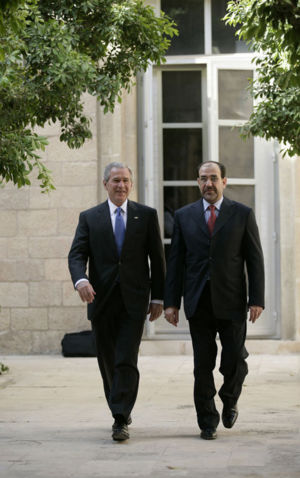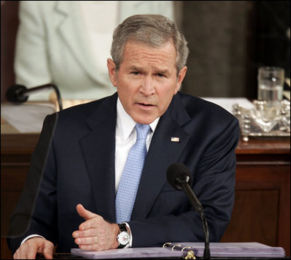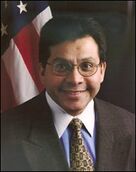George W. Bush: Difference between revisions
imported>Todd Coles |
imported>Todd Coles m (→War in Iraq) |
||
| Line 14: | Line 14: | ||
[[Image:20060613 g0i3795-820v.jpg|left|thumb|Bush meeting the new Iraqi Prime Minister [[Nouri al-Maliki]] in 2006, after the new regime was established following the invasion]] | [[Image:20060613 g0i3795-820v.jpg|left|thumb|Bush meeting the new Iraqi Prime Minister [[Nouri al-Maliki]] in 2006, after the new regime was established following the invasion]] | ||
The war in Iraq was the defining event of Bush's second term; as the war became increasingly unpopular his own ratings fell | The war in Iraq was the defining event of Bush's second term; as the war became increasingly unpopular his own ratings fell and his influence weakened. Bush stated three goals in launching the invasion: overthrowing the cruel and dangerous regime of [[Saddam Hussein]], establishing a model democracy in Iraq, and leaving after stability was assured. There was no question about the human rights violations committed by Hussein's regime within Iraq, but his dangers to the U.S. appeared exaggerated when no [[weapons of mass destruction]] were discovered. By 2005, the Iraqis formed a government, enacted a constitution and held elections. Even after these mile markers, parts of the nation were wracked by a violent insurgency as the two prominent Islamic sects, the Sunnis and the Shiites, endured heavy casualties. Over 2,000 American soldiers were killed by ambush by mid 2007. By late 2006, many Democratic leaders demanded a fixed timetable for troop withdrawal. A compromise was reached in summer 2007 whereby a major report would be issued by mid-September evaluating how well the Iraqis had achieved the goals set by the White House. | ||
==Courts and Justice == | ==Courts and Justice == | ||
Revision as of 16:05, 1 August 2007
George W. Bush became the 43rd president of the United States in January of 2001. His popularity soared in the aftermath of the 9-11 Attack, and operations in Iraq and the invasions of Afghanistan; he and his Vice President Dick Cheney won reelection in 2004.
He was elected as a Republican over Democrat Al Gore in a controversial election in 2000. In that election, although he lost the overall national popular vote, he won the Electoral College election, due to a 500-vote lead in Florida. His victory in Florida was corroborated by the 5-4 Supreme Court decision Bush v. Gore which ended Gore's efforts to recount the vote again. Bush was re-elected over Senator John Kerry in 2004 by a three million vote margin. Before becoming president, he was governor of Texas (1994-2001), and served as an aide to his father, President George H. W. Bush.
Important markers during his administration included the 9-11 terrorist attack, the invasions of Afghanistan and Iraq, the expansion of NATO to the Russian border, the midterm election gains of 2002, the midterm loss of Congress in the 2006 elections, improved relations with India, the passage of the PATRIOT Act, the No Child Left Behind education act, repeated large-scale tax cuts, the economic recovery, the boom (and later correction) in real estate, the debate on illegal immigration, the handling of the 2005 Hurricane Katrina disaster, the U.S. Attorneys dismissal controversy, and the appointments of conservatives to the Supreme Court and Federal Reserve chairmanship. Intense controversy in 2007 focused on the war in Iraq. Bush will be ineligible for the presidential election in 2008 due to a two-term limit in the United States Constitution.
September 11th and the War on Terror
On September 11, 2001, a team of 19 hijackers launched suicide attacks that destroyed the World Trade Center in New York and damaged the Pentagon, causing 3,000 deaths in the worst terrorist attack in American history. The militant Islamist Osama bin Laden, head of the al-Qaeda terrorist organization, was responsible for the attacks. Bush responded by instituting a U.S.-led "war on terror" to combat terrorism. He ordered the invasion of Afghanistan to overthrow the Taliban government, which had let bin Laden use the country as his base of operations. Despite an intensive manhunt, bin Laden himself was never found. The ramifications of the September 11th attacks also included the invasion of Iraq, overthrowing the dictatorial regime of Saddam Hussein, along with the country's subsequent slide into civil conflict; and the passage of the Patriot Act, to facilitate the detection of terrorist activities.
War in Iraq

The war in Iraq was the defining event of Bush's second term; as the war became increasingly unpopular his own ratings fell and his influence weakened. Bush stated three goals in launching the invasion: overthrowing the cruel and dangerous regime of Saddam Hussein, establishing a model democracy in Iraq, and leaving after stability was assured. There was no question about the human rights violations committed by Hussein's regime within Iraq, but his dangers to the U.S. appeared exaggerated when no weapons of mass destruction were discovered. By 2005, the Iraqis formed a government, enacted a constitution and held elections. Even after these mile markers, parts of the nation were wracked by a violent insurgency as the two prominent Islamic sects, the Sunnis and the Shiites, endured heavy casualties. Over 2,000 American soldiers were killed by ambush by mid 2007. By late 2006, many Democratic leaders demanded a fixed timetable for troop withdrawal. A compromise was reached in summer 2007 whereby a major report would be issued by mid-September evaluating how well the Iraqis had achieved the goals set by the White House.
Courts and Justice
Bush nudged the U.S. Supreme Court to the right with his successful nominations of John Roberts as Chief Justice and Samuel Alito as Associate Justice of the Supreme Court in 2005. Liberal opponents opposed these nominees as being too conservative, but both were speedily confirmed. His nomination of three judges to the federal circuit courts was threatened with filibuster from Senatorial Democrats, but a bipartisan coalition (calling itself the "Gang of 14") reached a compromise and these judges were also confirmed. In 2007, some alleged that Attorney General Alberto Gonzalez removed some district attorneys for political reasons, and some politicians demanded (but did not get) the resignation of Alberto Gonzalez [1] Fierce debates, some reaching the Supreme Court, raged over the proper legal status of prisoners from the Mideast conflict held in CIA prisons and the prison the U.S. operated at Guantanamo (in Cuba).
Social policy
During his presidency, Bush favored conservative social policy, but many conservatives complain that government spending continues to rise. He opposed same-sex marriage and supported a constitutional amendment to federally ban it, but the amendment was not formally proposed in Congress. He supported the Partial-birth Abortion Ban Act which prohibits a specific form of late-term abortion. The Act, which Clinton had vetoed, was passed by 2:1 majorities in Congress, signed by Bush, and was upheld in the Supreme Court in the case Gonzales v. Carhart.
Second Term
Bush was at the peak of his popularity when he was reelected in 2004. In 2005-6 his approval rating fell dramatically, with growing discontent from left, right and center. He tried in 2005 to use what he called his "political capital" to make significant long-term changes in the Social Security system. That system has been called the "third rail" of American politics because politicians who touch it get a severe jolt; that happend to Bush and his proposals went nowhere and gave the Democrats talking points. The Bush administration response to the 2005 Katrina disaster (hurricane and flooding in New Orleans region) was widely criticized and the Democrats alleged that the response showed administrative incompetence. The Iraq war dragged on, with mounting death tolls for American soldiers. The escalation of violent insurgency in Iraq was a major issue for the Democrats in the 2006 elections, as the Democrats united in calling for a withdrawal of American forces. By 2007, leading Republican Senators started to distance themselves from Bush, and the polls indicate Iraq was the single most negative factor in his declining popularity.
The Democrats "nationalized" the 2006 election, making national issues, especially Iraq, the center of their attacks. They won seven[2] of the most heavily contested Senate seats and took control of the Senate, and gained 30 seats to take control of the House. Both Houses were in Democratic hands for the first time since the 1992 elections, but the Democrats lacked enough votes to override a presidential veto.
In 2007 Bush put his prestige on the line in collaborating with Democrats for a major reform of the immigration system, which would have opened a path to citizenship for 12 million illegal immigrants (most of them from Central America and Mexico). Polling showed that many Americans think that US immigration policies and laws need to be reformed and some business community and religious groups supported President Bush's proposed legislation. [3][4] The conservative grass roots, activiated by talk-radio hosts who had long been pro-Bush, turned against him, denounced his plan as "amnesty" (that is, a reward for the illegal behavior in crossing the border), and defeated the plan. [5][6] It was defeated when 2/3 of Republican Senators voted it down in June 2007.
By mid 2007 Bush was on the defensive in a series of 'scandals' that hurt the administration. The Surgeon General resigned, and told Congress he had been pressured by Bush's political aides to suppress scientific information. The senior aide to Vice President Cheney was convicted of felony; then Bush controversially commuted his prison sentence. More damage came from the Justice Department, where Bush tried to fire nine Republican US attorneys for unexplained reasons; Democrats said he was using the Justice department for partisan political goals and that he fired the attorneys who did not play along. A series of senior Justice and White House officials were forced to resign as a result, as all the Democrats and most of the Republicans on the Senate Judiciary committee demanded the resignation of Attorney General Gonzales. Gonzales testified repeatedly that he could not remember any of the meetings that he attended regarding the firings, and refused to resign. On the other hand, the economy continued to prosper, which Bush credited to his series of tax cuts.
Bibliography
- Academic
- Abramson, Paul R., John H. Aldrich, and David W. Rohde. Change and Continuity in the 2004 and 2006 Elections (2007), 324pp
- Berggren, D. Jason, and Nicol C. Rae. "Jimmy Carter and George W. Bush: Faith, Foreign Policy, and an Evangelical Presidential Style." Presidential Studies Quarterly. 36#4 2006. pp 606+. online edition
- Campbell, Colin, and Bert A. Rockman, eds. The George W. Bush Presidency: Appraisals and Prospects. Congressional Quarterly Press, 2004.
- Campbell, Colin, Bert A. Rockman, and Andrew Rudalevige, eds.. The George W. Bush Legacy Congressional Quarterly Press, 2007. 14 essays by scholars
- Congressional Quarterly. CQ Almanac Plus highly detailed annual compilation of events in Congress, White House, Supreme Court, summarizing the weekly "Congressional Quarterly Weekly Report". (annual, 2002-2007)
- Corrado, Anthony, E. J. Dionne Jr., Kathleen A. Frankovic. The Election of 2000: Reports and Interpretations (2001) online edition
- Edwards III, George C. and Philip John Davies, eds. New Challenges for the American Presidency New York: Pearson Longman, 2004. 245 pp. articles from Presidential Studies Quarterly
- Greenstein, Fred I. ed. The George W. Bush Presidency: An Early Assessment Johns Hopkins University Press, 2003
- Greenstein, Fred I. “The Contemporary Presidency: The Changing Leadership of George W. Bush A Pre- and Post-9/11 Comparison” in Presidential Studies Quarterly v 32#2 2002 pp 387+. online edition
- Gregg II, Gary L. and Mark J. Rozell, eds. Considering the Bush Presidency Oxford University Press, 2004. 210 pp. British perspectives
- Hendrickson, Ryan C., and Kristina Spohr Readman, "From the Baltic to the Black Sea: Bush's NATO Enlargement." White House Studies. (2004) 4#3 pp: 319+. online edition
- Hilliard, Bryan, Tom Lansford, and Robert P Watson, eds. George W. Bush: Evaluating the President at Midterm SUNY Press 2004
- Jacobson, Gary C. “The Bush Presidency and the American Electorate” Presidential Studies Quarterly v 33 #4 2003 pp 701+. online edition
- Moens, Alexander The Foreign Policy of George W. Bush: Values, Strategy, and Loyalty. Ashgate, 2004. 227 pp.
- Sabato, Larry J. ed. The Sixth Year Itch: The Rise and Fall of the George W. Bush Presidency (2007), experts on the 2006 elections in major states
- Pro-Bush
- Barnes, Fred. Rebel-in-Chief: How George W. Bush Is Redefining the Conservative Movement and Transforming America (2006)
- Robert Draper. Inside the Bush White House: The Presidency of George W. Bush (2007), authorized biography
- Karen Hughes. George W. Bush: Portrait of a Leader, (2005)
- Bob Woodward. Plan of Attack (2003) on Iraq war
- Anti-Bush
- Bruce Bartlett, Impostor: How George W. Bush Bankrupted America and Betrayed the Reagan Legacy (2006), conservative attack by former aide
- James Moore and Wayne Slater. Bush's Brain: How Karl Rove Made George W. Bush Presidential. 2003. online edition
- Ron Suskind. The Price of Loyalty: George W. Bush, the White House, and the Education of Paul O’Neill (2004), complaints of ex Treasury Secretary
- Primary sources
- George W. Bush. George W. Bush on God and Country: The President Speaks Out About Faith, Principle, and Patriotism (2004)
See also
- ↑ , although seven senior Justice department officials did resign.
- ↑ Virginia, Montana, Missouri, Rhode Island, Pennsylvania, Ohio, and New Jersey.
- ↑ http://www.fairus.org/site/PageServer?pagename=research_researchd74c
- ↑ http://www.washingtonpost.com/wp-dyn/content/graphic/2007/06/04/GR2007060400089.html
- ↑ http://www.rasmussenreports.com/public_content/politics/just_22_favor_stalled_immigration_bill
- ↑ http://www.rasmussenreports.com/public_content/politics/immigration_bill_failure_proves_rasmussen_s_first_law_of_politics

